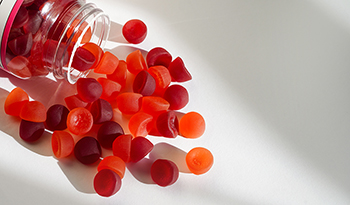Kreatiini: mitä se on, miten se toimii, + 7 todistettua hyötyä
Mikä on kreatiini?
Kreatiini on yksi suosituimmista ja tehokkaimmista ravintolisistä. Kreatiinilla, jota käytetään enimmäkseen lihasten terveyden ja liikunnan suorituskyvyn tukemiseen, on myös ikääntymistä estäviä, aivojen terveyttä ja muita positiivisia terveyshyötyjä.
Kreatiini on luonnollinen aine, jota tuotetaan kehossa ravintolisän lisäksi. Se koostuu kolmesta aminohaposta: L-arginiinista, L-glysiinistä ja L-metioniinista. Maksa, munuaiset ja haima tuottavat noin puolet kehon kreatiinitarjonnasta, noin 2 grammaa päivässä.
Kreatiinin ravintolähteet
Kreatiinia saadaan myös ravinnon lähteistä, kuten punaisesta lihasta ja äyriäisistä. Yksi kiloa raakaa naudanlihaa tai lohta tarjoaa 1-2 grammaa kreatiinia. Koska kasvipohjaisista ruokavalioista puuttuu kreatiinirikkaita lähteitä, kuten eläinlihaa ja äyriäisiä, kreatiinilisäys voi olla tärkeää riittävän kehon kreatiinitason ylläpitämiseksi.
Ravintolisäaineena kreatiinia on saatavana useissa eri muodoissa. Kreatiinimonohydraatti on suositeltava muoto tieteellisen näytön perusteella.
Mitä kreatiini tekee kehossa?
Kreatiinifosfaatin muodossa oleva kreatiini tehostaa lihasten energiantuotantoa nopeiden voiman ja nopeuden purskaamiseksi. Kun lihassolu supistuu, se vaatii energiaa, joka tuotetaan vapauttamalla yksi fosfaattiryhmä adenosiinitrifosfaatista (ATP), joka sitten muunnetaan adenosiinidifosfaatiksi (ADP). Kreatiinifosfaatti luovuttaa fosfaattiryhmänsä muuntaakseen ADP: n takaisin ATP:ksi. Kreatiniinin energiaa tuottavia vaikutuksia esiintyy myös muissa kudoksissa, erityisesti aivoissa.
Sen lisäksi, että kreatiini on energialähteenä, sillä on antioksidantteja, anti-inflammatorisia ja immuunijärjestelmää tukevia vaikutuksia.
Kreatiinin edut
Parantaa fyysistä suorituskykyä
Kreatiini on yksi parhaiten tutkituista ravintolisistä. Urheiluravinnassa sitä käytetään edistämään fyysistä suorituskykyä, lihasten kasvua ja korjausta. Tiedot ovat niin vahvoja yli 1000 julkaistusta kliinisestä tutkimuksesta ihmisillä, jotka osoittavat, että kreatiini voi lisätä korkean intensiteetin ja/tai toistuvien voimaharjoitusten suorituskykyä 10-20%, että International Society of Sports Nutrition (ISSN), American College of Sports Medicine (ACSM), American Dietetic Association (ADA) ja muut ovat todenneet, että ”kreatiini on tehokkain ravintolisä liikunnan suorituskyvyn ja lihasmassan lisäämiseksi.”
Kun otetaan huomioon kreatiinin rooli energiantuotannossa, sen tehokkuus on järkevää. Koska kreatiini auttaa täydentämään ATP:tä, se antaa urheilijoille ja kuntoharrastajille mahdollisuuden harjoitella kovemmin ja pidempään. Tämä etu antaa myös lihaksille mahdollisuuden reagoida voima- ja nopeusharjoitteluun voiman, lihasmassan ja suorituskyvyn lisäämiseksi.
Vaikka kreatiini tehostaa suorituskykyä, voimaa ja nopeusharjoittelua, tulokset tutkimuksista, joissa tutkittiin kreatiinilisäystä kestävyysurheilussa tai aerobisessa harjoittelussa, eivät ole osoittaneet hyötyä koulutetuille henkilöille suorituskyvyn parantamiseksi.1,2 Kestävyysurheilu tai aerobinen harjoittelu määritellään suurten lihasmassojen aktiviteeteiksi 3 minuutin ajan. Vaikka kreatiinilisäys ei välttämättä suoraan paranna kestävyysurheilijoiden suorituskykyä, sen on osoitettu auttavan estämään lihasvaurioita ja nopeuttamaan palautumista.3 Lisäksi kreatiinilisä voi parantaa suorituskykyä kestävyysaktiviteeteissa, jotka vaativat useita intensiteettinousuja ja/tai spurtin aikana kilpailun tai tapahtuman lopussa.4 Tällaisiin urheilulajeihin kuuluvat maastopyöräily, pyöräily, triathlon, maastohiihto ja soutu.
Lisää lihasten kasvua ja vähärasvaista kehon massaa
Kreatiinilisäyksen on osoitettu lisäävän vähärasvaista kehon massaa ihmisillä tehdyissä kaksoissokkoutetuissa tutkimuksissa.1,5,6 Nämä hyödyt johtuvat pääasiassa kreatiinia lisäävistä harjoituksista. Silti kreatiini parantaa myös lihasproteiinisynteesin kasvutekijöitä ja vähentää lihasten hajoamista, mikä voi myös edistää sen kykyä lisätä vähärasvaista kehon massaa.
Määrittääkseen kreatiinilisäyksen hyödyt lihaskasvulle tutkijat analysoivat äskettäin 28 ihmisen kliinisen tutkimuksen tuloksia.6 Tilastot osoittivat, että kun kreatiinilisää yhdistettiin paino- tai vastustusharjoitteluun miehillä iästä riippumatta, se lisäsi vähärasvaista kehon massaa keskimäärin 1,46 kg (3,2 paunaa), kun taas naisilla tämä nousu oli merkittävästi pienempi (0,29 kg) (0,6 paunaa). Kreatiini ei onnistunut lisäämään vähärasvaista kehon massaa niillä, jotka eivät harrastaneet säännöllisiä voimaharjoitteluharjoituksia.
Lihasmassan hyödyt vanhemmilla koehenkilöillä ovat erityisen tärkeitä. Ikääntyessämme lihakset menetetään merkittävästi. Tätä prosessia kutsutaan sarkopeniaksi. Terveen ikääntymisen kannalta ensisijainen tavoite on sarkopenian estäminen, mikä on kriittinen, koska se on tärkeä tekijä fyysisessä toiminnassa ja elämänlaadussa. Kreatiinilisäyksen on osoitettu parantavan fyysistä suorituskykyä, lihasten toimintaa ja vähärasvaista kehon massaa iäkkäillä miehillä ja naisilla.7-10 Lisäys kreatiinilla (0,1 g/kg) heti harjoituksen jälkeen tuotti suurimman hyödyn.
Edistää vedenpidätystä
Kreatiinilla on lisävaikutuksia kuin energiaa lisäävän ja lihasten kasvun edistämisen vasteena korkean intensiteetin harjoitteluun. Yksi kreatiinin keskeinen vaikutus on, että se edistää vedenpidätystä tavalla, joka edistää nesteytystä,1 mikä voi parantaa harjoituksen suorituskykyä ja lämmönsietokykyä. Kaksoissokkoutetussa, lumekontrolloidussa tutkimuksessa kollegiaalisilla jalkapalloilijoilla 5 g kreatiinia päivittäin neljän kuukauden ajan saaneilla oli huomattavasti vähemmän lihaskouristuksia, nestehukkaa ja lämpösairauksia kuin lumelääkeryhmässä.11
Apua elpymiseen
Kreatiini auttaa myös vähentämään lihasvaurioita ja auttaa palautumisessa harjoituksen jälkeen. Nämä tulokset liittyvät jälleen kreatiinin vaikutukseen lihasenergian tuotantoon ja joihinkin anti-inflammatorisiin vaikutuksiin. Vähemmän lihasvaurioita harjoituksen aikana johtaa vähemmän harjoituksen jälkeiseen lihaskipuun ja nopeampaan palautumiseen. Ihmisen kaksoissokkoutetut, lumekontrolloidut tutkimukset ovat osoittaneet kreatiinin alentavan tulehduksen veren markkereita ja parantavan muita aineenvaihduntamarkkereita kestävyys- ja korkean intensiteetin liikunnassa, mikä osoittaa, että kreatiinilisäys voi olla hyödyllinen aerobisessa ja anaerobisessa harjoituksen palautumisessa.3,12-15 Vähemmän lihasvaurioita ja parempi toipuminen harjoittelusta ovat tärkeitä tavoitteita etenkin eliittiurheilijoille.
Tukee tervettä ikääntymistä ja aivojen terveyttä
Kreatiinilla on joitain ikääntymistä estäviä ja positiivisia vaikutuksia aivojen terveyteen. On tunnettua, että ikääntyminen johtaa lihasmassan, luun tiheyden, kognitiivisen toiminnan ja muistin vähenemiseen. Tutkimukset viittaavat siihen, että kreatiini voi parantaa yleistä terveyttä ikääntyessämme hidastamalla toimintakyvyn heikkenemisen etenemistä ja parantamalla verensokerin hallintaa, kolesterolia ja triglyseriditasoja. Mitä tulee aivojen terveyteen, useat ikääntyneillä aikuisilla tehdyt tutkimukset ovat osoittaneet, että 5 g kreatiinin lisäys päivittäin kuuden viikon ajan parantaa muistia ja suorituskykyä älykkyys- ja kognitiivisissa toimintakokeissa.16-18
Parantaa mielialaa ja aivojen toimintaa
Kreatiinilla on valtava lupaus mielialan ja hyvinvoinnin parantamisessa.19 Useat ihmisillä kaksoissokkoutetut, lumekontrolloidut tutkimukset ovat vahvistaneet, että kreatiinilisäys voi parantaa mielialapisteitä lumelääkkeeseen verrattuna.20,21 Kreatiini ei ole vain parantanut mielialapisteitä, vaan tutkijat ovat osoittaneet, että kreatiinilisäys parantaa aivojen energian tuotantoa tärkeimmillä aivoalueilla. Korkeammat aivoenergian tasot liittyivät positiivisempiin mielialapisteisiin.
Tukee aineenvaihdunnan terveyttä ja verensokerin hallintaa
Viimeaikaiset tutkimukset ovat osoittaneet, että kreatiinilisäys voi parantaa glukoositoleranssia ja insuliiniherkkyyttä. Tätä vaikutusta näyttää välittävän lisääntyneet lihaskreatiinivarastot, jotka helpottavat suurempaa glukoosin imeytymistä lihassoluihin, parantavat solujen energian aineenvaihduntaa ja johtavat suotuisiin muutoksiin lihasmassassa ja toiminnassa, mikä lopulta tukee yleistä aineenvaihdunnan terveyttä.
Onko kreatiini turvallista?
International Society of Sports Nutrition on todennut, että kreatiini on turvallista ja hyvin siedettävää sekä lyhytaikaisessa että pitkäaikaisessa käytössä, mukaan lukien annoksina jopa 30 grammaa päivässä viiden vuoden ajan terveillä yksilöillä. Tämä lausunto perustuu yli tuhanteen kliiniseen tutkimukseen ihmisillä, joihin osallistujat vaihtelevat lapsuudesta vanhuksiin ja heikkoihin. Kreatiini on ollut markkinoilla myös 1990-luvulta lähtien, ja siinä on miljardeja annoksia kreatiinia. Aiemmat haittavaikutukset tai mahdolliset haittavaikutukset on kaikki kumottu hyvin kontrolloiduissa kliinisissä ihmisillä tehdyissä tutkimuksissa. Pikemminkin, kuten edellä todettiin, kreatiinimonohydraattilisäyksen on havaittu vähentävän monien näiden anekdoottisesti raportoitujen sivuvaikutusten esiintyvyyttä.1
Pitäisikö naisten ottaa kreatiinia?
Kyllä, naisten pitäisi ehdottomasti ottaa kreatiinia. Vaikka suurempi osa miehistä on historiallisesti käyttänyt kreatiinia - suurelta osin johtuen sen yhteydestä lihasten rakentamiseen ja urheilusuoritukseen - viimeaikaiset tutkimukset viittaavat siihen, että naiset voivat kokea kreatiinilisäyksen suhteellisia tai jopa suurempia suhteellisia terveyshyötyjä miehiin verrattuna. Naisilla kreatiinin ei ole osoitettu vain tukevan voiman, kestävyyden, vähärasvaisen kehon massan ja toiminnallisen suorituskyvyn paranemista, mutta se voi myös tarjota naisille aineenvaihduntaa ja kognitiivisia etuja. Jotkut tutkimukset viittaavat siihen, että nämä edut johtuvat lähtötilanteen lihasten ja aivojen kreatiinivarastojen eroista ja hormonaalisista vaikutuksista.24,25
Annostus
Yleensä suositellaan 3—5 gramman päivittäistä annosta. Sen ottaminen harjoituksen jälkeen voi tuottaa parhaat tulokset. Usein suositellaan 5 gramman kreatiinin latausvaihetta, joka otetaan neljä kertaa päivässä 5-7 päivän ajan, jotta lihakset kyllästetään kreatiinilla, jotta hyöty paranee nopeammin. Koska kreatiini vetää vettä lihaksiin, on tärkeää varmistaa riittävä vedensaanti asianmukaisen toiminnan tukemiseksi. Tämä tarkoittaa noin 8-10 lasillista vettä päivittäin, etenkin lastausvaiheen aikana.
Viitteet:
- Kreider RB, Kalman DS, Antonio J, et ai. International Society of Sports Nutrition -kanta: kreatiinilisäyksen turvallisuus ja tehokkuus liikunnassa, urheilussa ja lääketieteessä. J Int Soc Urheilu Nutr. 2017; 14:18.
- Fernandez-Landa J, Santibanez-Gutierrez A, Todorovic N, Stajer V, Ostojic SM. Kreatiinimonohydraatin vaikutukset kestävyyteen koulutetussa väestössä: järjestelmällinen katsaus ja meta-analyysi. Sports Med. 2023 toukokuu; 53 (5): 1017-1027.
- Vaha B, Kerksick CM, Jagim AR, et ai. Kreatiini liikuntaan ja urheilusuoritukseen, palautumisnäkökohtien kanssa terveille väestöille. Ravinteet. 2021 2. kesäkuuta; 13 (6): 1915.
- Forbes SC, Candow DG, Neto JHF, Kennedy MD, Forbes JL, Machado M, Bustillo E, Gomez-Lopez J, Zapata A, Antonio J. Kreatiinin lisäys ja kestävyyssuorituskyky: nousut ja sprintit kilpailun voittamiseksi. J Int Soc Sports Nutr. 2023 joulukuu; 20 (1): 2204071.
- Burke R, Piñero A, Coleman M, Mohan A, Sapuppo M, Augustin F, Aragon AA, Candow DG, Forbes SC, Swinton P, Schoenfeld BJ. Kreatiinilisäyksen vaikutukset yhdistettynä vastustusharjoitteluun lihasten hypertrofian alueellisiin mittauksiin: järjestelmällinen katsaus meta-analyysillä. Ravinteet. 2023 huhtikuu 28; 15 (9): 2116.
- Delpino FM, Figueiredo LM, Forbes SC, Candow DG, Santos HO. Iän, sukupuolen ja liikuntatyypin vaikutus kreatiinilisäyksen tehokkuuteen vähärasvaiseen kehon massaan: Satunnaistettujen kliinisten tutkimusten systemaattinen katsaus ja meta-analyysi. Ravitsemus. 2022 marras-joulukuu; 103-104:111791.
- Davies TW, Watson N, Pilkington JJ, et ai. Kreatiinilisäys fyysisen toiminnan optimoimiseksi potilaalla, jolla on toimintahäiriön riski: Systemaattinen katsaus ja meta-analyysi. JPEN J Parenter Enteral Nutr. 2024 toukokuu; 48 (4): 389-405.
- Johannsmeyer S, Candow DG, Brahms CM, Michel D, Zello GA. Kreatiinilisäyksen ja drop-set-vastustusharjoituksen vaikutus kouluttamattomilla ikääntyvillä aikuisilla. Exp Gerontol. 2016 lokakuu; 83:112-9.
- Gualano B, Macedo AR, Alves CR, Roschel H, Benatti FB, Takayama L, Sá Pinto AL, Lima FR, Pereira RM. Kreatiinilisäys ja vastustuskykyharjoittelu haavoittuvilla vanhemmilla naisilla: satunnaistettu kaksoissokkoutettu lumekontrolloitu kliininen tutkimus. Exp Gerontol. 2014 toukokuu; 53:7-15.
- Candow DG, Vogt E, Johannsmeyer S, Forbes SC, Farthing JP. Strateginen kreatiinilisä ja vastustuskykyharjoittelu terveillä vanhemmilla aikuisilla. Appl Physiol Nutr Metab. 2015 heinäkuu; 40 (7): 689-94.
- Kilduff LP, Georgiades E, James N, et ai. Kreatiinilisän vaikutukset sydän-, aineenvaihdunta- ja lämpösäätelyvasteisiin lämmössä harjoituksen aikana kestävyysharjoitetuilla ihmisillä. Int J Sport Nutr Exercin Metab. 2004; 14 (4) :443—460.
- Cooke MB, et ai. Kreatiinilisä parantaa lihasvoiman palautumista epäkeskisesti aiheuttamien lihasvaurioiden jälkeen terveillä yksilöillä. J Int Soc Sports Nutr. 2009; 6:13. doi: 10.1186/1550-2783-6-13.
- Yamaguchi S, Inami T, Ishida H, et ai. Aikaisemman kreatiinin saannin vaikutus 28 päivän ajan nopeutettuun toipumiseen liikunnan aiheuttamista lihasvaurioista: kaksoissokkoutettu, satunnaistettu, lumekontrolloitu tutkimus. Ravinteet. 2024 20. maaliskuuta; 16 (6): 896.
- Deminice R, Rosa FT, Franco GS, Jordao AA, de Freitas EC. Kreatiinilisän vaikutukset oksidatiiviseen stressiin ja tulehduksellisiin markkereihin toistuvan sprinttiharjoituksen jälkeen ihmisillä. Ravitsemus. 2013 syyskuu; 29 (9): 1127-32.
- Roberts PA, Fox J, Peirce N, et ai. Kreatiinin nauttiminen lisää ravinnon hiilihydraattivälitteistä lihasten glykogeenin superkompensaatiota ensimmäisten 24 tunnin palautumisen aikana ihmisillä pitkittyneen tyhjentävän liikunnan jälkeen. Aminohapot. 2016 elokuu; 48 (8): 1831-42.
- Jaramillo AP, Jaramillo L, Castells J, Beltran A, Garzon Mora N, Torres S, Barberan Parraga GC, Vallejo MP, Santos Y.Kreatiinin tehokkuus metabolisessa suorituskyvyssä: järjestelmällinen katsaus ja meta-analyysi. Cureus. 2023 syys 15; 15 (9): e45282.
- Forbes SC, Candow DG, Ferreira LHB, Souza-Junior TP. Kreatiinilisäyksen vaikutukset ikääntyneiden aikuisten lihas-, luu- ja aivotoiminnan ominaisuuksiin: kertomuksellinen katsaus. J Ruokavalion lisäys 2022; 19 (3): 318-335.
- Roschel H, Gualano B, Ostojic SM, Rawson ES. Kreatiinilisäys ja aivojen terveys. Ravinteet. 2021 10. helmikuuta; 13 (2): 586.
- Kious BM, Kondo DG, Renshaw PF. Kreatiini masennuksen hoitoon. Biomolekyylit. 2019 23. elokuuta; 9 (9): 406.
- Kondo DG, Forrest LN, Shi X, et ai. Kreatiinikohteen sitoutuminen aivojen bioenergiaan: Annosvaihteleva fosfori-31 magneettiresonanssispektroskopiatutkimus murrosikäisillä naisilla, joilla on SSRI-resistentti masennus. Aminohapot 2016:1941 —1954.
- Yoon S, Kim JE, Hwang J, Kim TS, Kang HJ, Namgung E, Ban S, Oh S, Yang J, Renshaw PF, Lyoo IK. Kreatiinimonohydraatin lisäyksen vaikutukset aivojen aineenvaihduntaan ja verkon tulosmittauksiin naisilla, joilla on vakava masennus. Biol Psychiatria. 2016 15. syyskuuta; 80 (6): 439-447.
- Gualano B, de Salles Painelli V, Roschel H, et ai. Kreatiinilisäys ja glykeeminen kontrolli tyypin 2 diabeteksessa: satunnaistettu, kaksoissokkoutettu, lumekontrolloitu tutkimus. Med Sci Sports Exerc.2011; 43 (5): 770-778.
- Gualano B, Novaes RB, Artioli GG, et ai. Kreatiinilisän vaikutukset glukoositoleranssiin ja insuliiniherkkyyteen istuvilla terveillä miehillä, jotka käyvät aerobista harjoittelua. Aminohapot. 2008; 34 (2): 245-250.
- Smith-Ryan AE, Cabre HE, Eckerson JM, Candow DG. Kreatiinilisäys naisten terveydessä: elinkaaren näkökulma. Ravinteet. 2021 8. maaliskuuta; 13 (3): 877.
- Candow DG, Chilibeck PD, Forbes SC, et ai. Kreatiinilisä ja ikääntyvä tuki- ja liikuntaelinten terveys J Nutrin terveyden ikääntyminen. 2019; 23 (3): 251-259.
VASTUUVAPAUSLAUSEKE:Tämän hyvinvointiblogin tarkoituksena ei ole tarjota diagnooseja...
















































































 Sisällysluettelo
Sisällysluettelo














